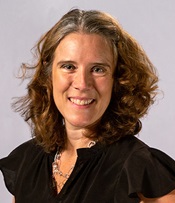
The Future of Sensory Science: An Intergenerational Conversation
An emerging researcher and a seasoned sensory scientist discuss how the study of human perception is evolving and what it means for the science of food.

Sensory science is a multidisciplinary field that uses sight, smell, taste, sound, and touch to measure, interpret, and understand human responses to foods and beverages. And it’s one that continues to grow and adapt alongside swiftly changing consumer preferences and the social, technological, and environmental challenges shaping the future of food. Where is the field headed next and what can the younger generation of sensory scientists—those who will inherit these challenges—learn from mentors in the field?

Soon-to-be sensory scientist Jenna Fryer, a doctoral candidate at Oregon State University, is already marshaling her expertise to solve problems posed by the climate crisis through research exploring the impact of wildfire smoke on the sensory properties of wine. This month, she sat down with veteran sensory scientist Karen Graves, vice president of shared technical services at Bell Flavors & Fragrances and a past chair of IFT’s Sensory & Consumer Sciences Division to discuss sensory’s future, its new and unfolding possibilities, and how those joining the field can best position themselves for success.
“These conversations help the younger generation get inspired by those who came before us,” Fryer says. “They demystify the field and help us establish lasting connections with mentors.”
JF: Describe the work you do at Bell.
KG: As vice president of shared technical services, I oversee a cross-functional team that guides select domestic and international flavor and fragrance R&D initiatives to increase top-line and bottom-line growth. In addition, I champion an innovation team that extends Bell technology to new applications.
JF: What do you like most about sensory science?
KG: I love the community of sensory professionals and students. It’s a diverse field that combines psychology, data science, physiology, and neuroscience, and I love this multidisciplinary aspect. You meet so many knowledgeable people, and everyone comes together as a community to collaborate and help the discipline advance. Also, I’m a people person. I enjoy sensory research because I like being around people and exploring how they think and perceive things. I like interacting with consumers through focus groups and being behind the glass mirror observing them.
JF: What is the importance of sensory science for the future of food?
KG: The future of food is an exciting space, and the importance of the sensory experience for consumers is never going to go away. If something doesn’t taste good or meet customers’ needs and expectations, they aren’t going to buy it—no matter what interesting or novel scientific advancements have been made. We now find ourselves at a unique moment where we can leverage new technologies to look deeper into how we interact with food to make purchasing decisions. Using virtual reality, for example, we can push boundaries and explore how we take sensory cues from a new environment. The increase in online food shopping has led to an exciting new area—how can we deliver a sensory experience in a virtual landscape? Nowadays, new products are popping up on Instagram and consumers are shopping for groceries with the click of a button on an app. That is where I see sensory moving in the future—being nimble enough to say, OK, here’s how people are going to be interacting with and buying food differently, and here’s how we can ensure we measure and convey the sensory experience in a way that’s approachable to them.
JF: Artificial intelligence is a hot-button topic across the food industry. How do you see this tool being used in sensory science?
KG: AI is all about machine learning and getting a machine to do what a human would do. We’ve already, as a field, incorporated elements of automation to help us. We no longer hand calculate our statistics, for example. We have a machine to do that. So, there’s an element of basic AI that we use every day, assuming we’re using a computerized program for data analysis. I think AI can be a useful tool that complements sensory evaluation as we adapt to an ever-changing world and consumer landscape, but one important thing to remember is that its outputs are only as good as the inputs we give. As we look toward taking advantage of AI, sensory scientists need to remember the basics and make sure we are collecting data effectively and accurately to ensure valid inputs. AI can be used to make connections within the data that could be overlooked, look at formulation changes from a new perspective, and predict from a consumer perspective what the “next best thing” could be. We must recognize, though, that AI is there to help us do tasks and define better insights faster. It’s not there to replace what we do.
JF: What advice do you have for the next generation of sensory scientists?
KG: Take time to learn from other disciplines. Be open to other opinions and ideas. The insights you can gain from areas outside of food will make you a more effective scientist. Communication and business savvy are critical. I would encourage students to take classes in business, marketing, communications, and presentation skills. You need to be able to convey your ideas in a way that resonates with your audience and tell a story so that people walk away and remember it. When you come out of school, you’re an expert in your scientific area, but you’ve got to be able to communicate your findings to a diverse population. You’ve got to be able to talk to the lab tech, the R&D team, the middle managers, and the executives who make the final decisions. Additionally, to appreciate sensory science is to be aware of our history. To truly learn how we can evolve for the future, we need to be mindful of how we started, conquered challenges, and adapted throughout the years.
Author

Jenna Fryer is a doctoral candidate in food science and technology at Oregon State University and winner of the 2023 Institute of Food Technologists Student Association (IFTSA) Graduate Research Competition for her research “Sipping Smoke: What Is the Sensory Impact of Wildfires on Wine?” She currently serves as IFTSA’s vice president of events and experiences.
Brain Food Blog Spotlight

March Content Spotlight: Sensory Science
Stay up to date on the latest health and nutrition topics and trends with IFT's featured resources, from blogs to peer-reviewed articles to on-demand videos.
